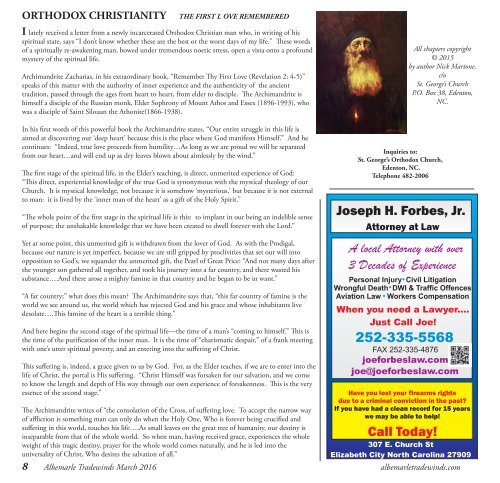Albemarle Tradewinds March 2016 Final Web
March 2016
March 2016
Create successful ePaper yourself
Turn your PDF publications into a flip-book with our unique Google optimized e-Paper software.
ORTHODOX CHRISTIANITY<br />
THE FIRST L OVE REMEMBERED<br />
I lately received a letter from a newly incarcerated Orthodox Christian man who, in writing of his<br />
spiritual state, says “I don’t know whether these are the best or the worst days of my life.” These words<br />
of a spiritually re-awakening man, bowed under tremendous noetic stress, open a vista onto a profound<br />
mystery of the spiritual life.<br />
Archimandrite Zacharias, in his extraordinary book, “Remember Thy First Love (Revelation 2: 4-5)”<br />
speaks of this matter with the authority of inner experience and the authenticity of the ancient<br />
tradition, passed through the ages from heart to heart, from elder to disciple. The Archimandrite is<br />
himself a disciple of the Russian monk, Elder Sophrony of Mount Athos and Essex (1896-1993), who<br />
was a disciple of Saint Silouan the Athonite(1866-1938).<br />
All chapters copyright<br />
© 2015<br />
by author Nick Martone,<br />
c/o<br />
St. George’s Church<br />
P.O. Box 38, Edenton,<br />
NC.<br />
In his first words of this powerful book the Archimandrite states, “Our entire struggle in this life is<br />
aimed at discovering our ‘deep heart’ because this is the place where God manifests Himself.” And he<br />
continues: “Indeed, true love proceeds from humility…As long as we are proud we will be separated<br />
from our heart…and will end up as dry leaves blown about aimlessly by the wind.”<br />
The first stage of the spiritual life, in the Elder’s teaching, is direct, unmerited experience of God:<br />
“This direct, experiential knowledge of the true God is synonymous with the mystical theology of our<br />
Church. It is mystical knowledge, not because it is somehow ‘mysterious,’ but because it is not external<br />
to man: it is lived by the ‘inner man of the heart’ as a gift of the Holy Spirit.”<br />
“The whole point of the first stage in the spiritual life is this: to implant in our being an indelible sense<br />
of purpose; the unshakable knowledge that we have been created to dwell forever with the Lord.”<br />
Yet at some point, this unmerited gift is withdrawn from the lover of God. As with the Prodigal,<br />
because our nature is yet imperfect, because we are still gripped by proclivities that set our will into<br />
opposition to God’s, we squander the unmerited gift, the Pearl of Great Price: “And not many days after<br />
the younger son gathered all together, and took his journey into a far country, and there wasted his<br />
substance….And there arose a mighty famine in that country and he began to be in want.”<br />
“A far country;” what does this mean? The Archimandrite says that, “this far country of famine is the<br />
world we see around us, the world which has rejected God and his grace and whose inhabitants live<br />
desolate….This famine of the heart is a terrible thing.”<br />
And here begins the second stage of the spiritual life—the time of a man’s “coming to himself.” This is<br />
the time of the purification of the inner man. It is the time of “charismatic despair,” of a frank meeting<br />
with one’s utter spiritual poverty, and an entering into the suffering of Christ.<br />
This suffering is, indeed, a grace given to us by God. For, as the Elder teaches, if we are to enter into the<br />
life of Christ, the portal is His suffering. “Christ Himself was forsaken for our salvation, and we come<br />
to know the length and depth of His way through our own experience of forsakenness. This is the very<br />
essence of the second stage.”<br />
Inquiries to:<br />
St. George’s Orthodox Church,<br />
Edenton, NC.<br />
Telephone 482-2006<br />
<br />
<br />
<br />
<br />
<br />
<br />
<br />
<br />
<br />
<br />
<br />
<br />
<br />
<br />
<br />
<br />
<br />
The Archimandrite writes of “the consolation of the Cross, of suffering love. To accept the narrow way<br />
of affliction is something man can only do when the Holy One, Who is forever being crucified and<br />
suffering in this world, touches his life….As small leaves on the great tree of humanity, our destiny is<br />
inseparable from that of the whole world. So when man, having received grace, experiences the whole <br />
weight of this tragic destiny, prayer for the whole world comes naturally, and he is led into the<br />
<br />
universality of Christ, Who desires the salvation of all.”<br />
<br />
8 <strong>Albemarle</strong> <strong>Tradewinds</strong> <strong>March</strong> <strong>2016</strong> albemarletradewinds.com

















